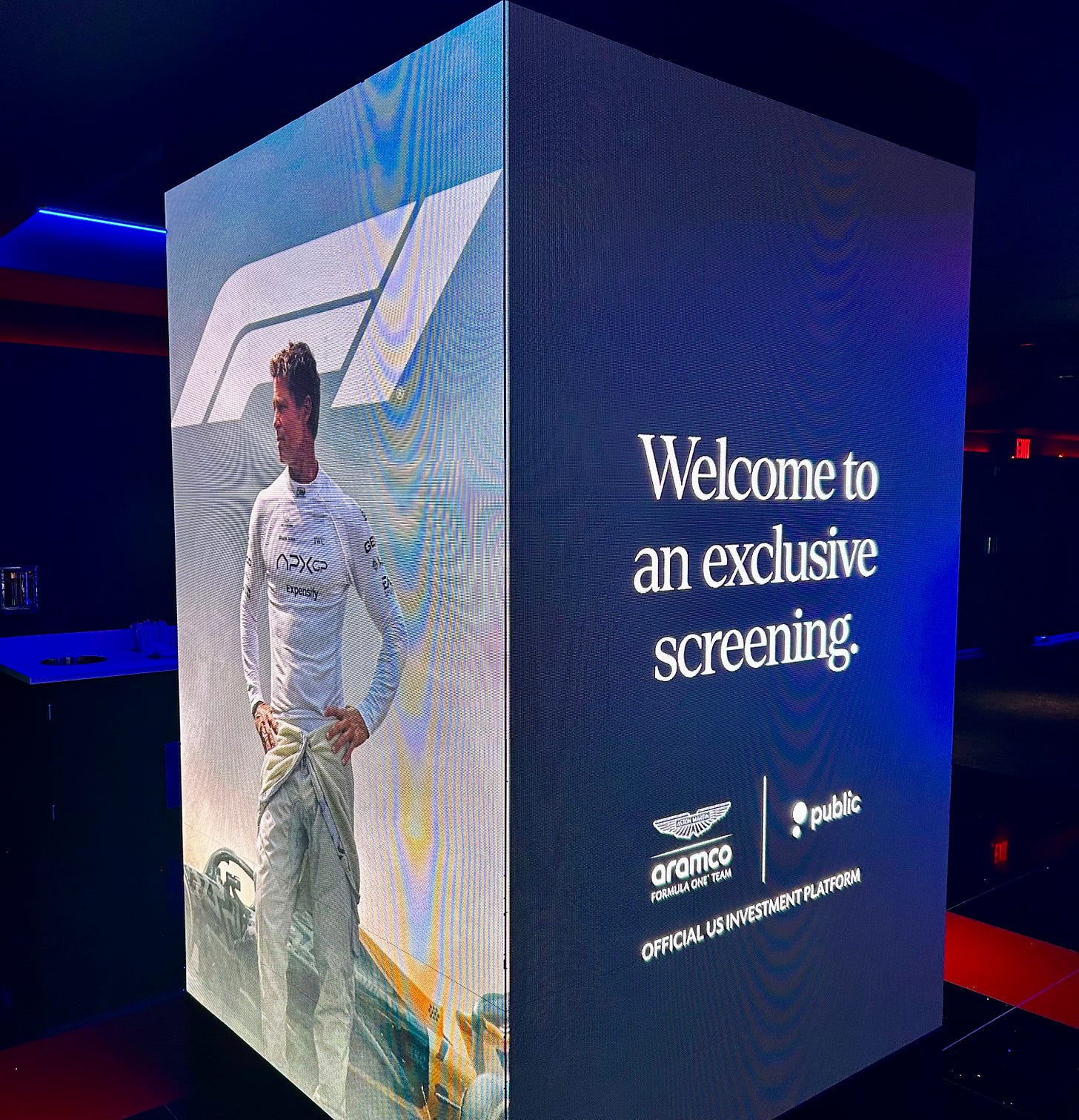Friction in a world full of shortcuts
An increasingly digital world places a premium on IRL.
On Wednesday, I found myself in the only movie theater in New York playing Brad Pitt’s new Formula 1 movie.
It was a private screening hosted by Public, one of the partners my startup works with on our financial newsletter.
F1 was excellent and sleek and loud. Brad Pitt still looks plenty youthful. It was a treat to see it before the rest of the world.
Yet what I can’t stop thinking about now is the intentionality of the night.
The team at Public prepared custom popcorn buckets and drink menus, custom digital signage wrapping the walls, and even bespoke trailers before the movie.
As we filtered out after the credits, Public — which also sponsors Aston Martin — was waiting to send us home with custom Formula 1-branded hats.
We live in a time of infinite digital reach and endless content. That strange virtual abundance has made attention cheap and memory shallow, and it’s led to most interactions being filtered through screens.
That’s not to say there’s nothing meaningful that happens online, because there is. But the sheer volume of content has diluted the weight of most digital happenings.
Since brands are constantly vying for attention on a noisy yet frictionless internet, the ones who stand out will be those that lean into the friction of the physical world.
(By “friction” I mean anything that adds cost, effort, or context to an interaction — the things digital platforms have worked hard to eliminate.)
Real-world, high-effort initiatives have become asymmetric bets.
Think about it. It would have been easier for Public to give me a code to access the movie on a laptop. But an at-home activity sends the opposite message of “you had to be there.”
I would have forgotten about it soon after. I certainly wouldn’t have taken any time to write about it.
Nothing else builds affinity for a brand like getting people physically in a room. The effort it takes to host something thoughtful squashes suspicions of a viral stunt or growth hack.
In optimizing itself for scale, the world has put a premium on intimacy.
Effort as a luxury
People spend all day consuming low-context information.
The tweets and videos that populate our newsfeeds don’t appear in relation to anything. They are randomized soundbites that we forget about as we scroll past.
Particularly as AI-generated content becomes indistinguishable from human-made work, it’s more valuable than ever to create what cannot be mistaken as mass-produced.
I’m still thinking about the F1 screening, for instance, because the messaging was effortful and contextualized:
Public sponsors Aston Martin and its logo appears on racing cars like those in F1
Hosting a Formula 1-themed event promotes both Public and Aston Martin
The messaging and narrative was sticky for attendees who didn’t know the two brands worked together
It was just smart all around. It’s the kind of thing people want to tell their friends about.
Online, interactions are forgettable and fleeting because there is no cost to send or receive. And while we spend more time online than ever, people still associate cost with intent.
It’s instinctive to appreciate interactions that we sense demand more effort.
That’s a perennial paradox of improving technology.
The world’s best engineers are constantly working to remove friction from our lives, but it isn’t self-evident that the outcomes are net-positive.
Sure, sometimes easier is better. But too little friction has perverse effects.
A few off the top of my head:
Messaging killed spontaneous phone calls
Uber makes long walks less likely to happen
One-click checkout makes it easy to overspend
Remote work erased serendipitous conversations
Frictionless design is good for speed but terrible for a lot of other satisfying parts of life. People can’t help but optimize for it though.
Odd to say, but effort itself does manifest as a modern luxury. Not because it’s flashy or expensive, but because it’s rare.
Effort — that is, friction — now signals care and intent.
There’s simply something admirable about doing what cannot be automated in the age of automation.
It’s why Public’s F1 screening resonated. It was hand-crafted, specific and subtle.
Friction feels good when there’s a shortcut to everything.
Phil Rosen
Co-founder & Editor-in-Chief, Opening Bell Daily
Thank you for reading. If you enjoyed this post, consider hitting the “like” button to help boost visibility. If the ideas resonated, I’d love to hear why — reply directly to this email or leave a comment below.




really nice and insightful post. Thanks for having inspired me!